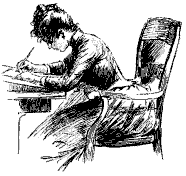With the fantastic support of the nice people in Minnesota I have started to put all the pieces of my unknown family together, and it must be a kind of record. After only a month I have found and recorded a great part of the Martinson family of Aitkin.
We are going to surprise all of the living descendants of our grandfather Jöns August, the Swedish son of John Martinson, so this will be our best Christmas gift this year! Amazing!
As you can see of my short story, there is a Swedish part today in the new Martinson file at the museum in Aitkin. Shirley Davies, a great friend, has started it and hopefully the file will be a help for others of the Martinson family over there. And maybe some will make contact with me and let me know more about the family story in Minnesota.
This is my story so far, for you to use on the Aitkin site ~ Ingrid Wikberg, November 2003

THE FAMILY CHURCH
JOHN MARTINSON'S SWEDISH SON AND HIS DESCENDENTS
JOHN MARTINSON'S AMERICAN FAMILY IN AITKIN, MN
COMING TO AMERICA ~ THE LONG WAY!

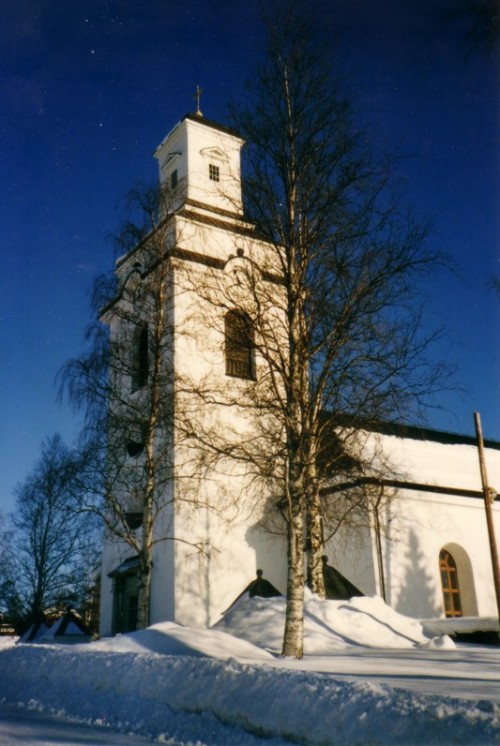
This is the Kyrka in Berg parish, the church that the Martinsons attended and where the Swedish members of the family are buried in the old cemetery. The church was built 1792. I took the picture on 13 Feb 1988, the same day of the burial of my mother Ingeborg, daugher of J A Ekberg. It was a cold, very cold day but with sunshine and a sky so blue that it looked like a summer sky. The steamer bridge lies close to the church and is still used today in the summertime for trips acros the lake Storsjön, but with new rebuilt and repaired boats. It is popular for tourist trips.

JOHN MARTINSON'S SWEDISH SON AND HIS DESCENDENTS
Jon Mårtenson (John Martinson)
b. 3 Nov 1850 in Berg parish, Jämtland, Sweden
d. 23 May 1938 Aitkin, MN USA
He had a great love affair with Anna Jönsson
b. 5 May 1845 in Kövra, Myssjö parish, Jämtland, Sweden
d. 18 April 1924 in Berg parish, Jämtland,Sweden
Their son was Jöns August Ekberg
b. 29 Sept 1872
d. 3 June 1936
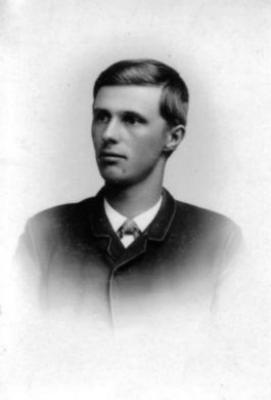
Jöns August Ekberg
Anna never married and lived for her only son, to shelter and comfort him. But in the family it was not allowed to talk about Jon, and the "unknown" father became a secret over the years. Anna lived with her mother, a widow, and worked as servant girl and as helper in farm families all her life. She was supported by her son when growing old and she died in the home of her son.
Jöns August, he called himself "J. A." got himself a new surname: Ekberg. He married, got a little farm and also got himself a profession as a shoemaker, but most of all he sang and played. Together with friends he started a men's choir called "Bergs-Uvarne" (Mountain Owls) in Berg parish and they toured around in the province and became well known and appreciated. (The word 'Berg' can be translated Mountain!) He was known as a talented and artistic person and spent most of his income on notes and books. The children didn't get shoes to use for summertime as a result of this.
But all the children remembered their childhood and their father with joy: "When father was home and played and sang and told stories for us ~ it was just like an adventure and there was mostly laughter through the days." All the children of J.A. became very talented. They all played instruments, sang both in choirs and as solists, they painted, wrote and brought this over to their children and the atmosphere at home became more or less creative and intellectual.

While researching the church records of births of Berg parish for 1872 we found that it was confirmed by Jon Mårtenson himself that he was the father of Jöns August. Then via the church books and by passenger lists from Trondheim, Norway, the unknown side of Jöns August's family started to be known.
John Martinson, as Jon Mårtenson later called himself after arriving to USA, married 13 Oct. 1878 with another woman: Gertrud Johnsdotter b.21 Feb. 1857 in Skålan, Klövsjö parish, Jämtland, Sweden and they started a new family.
With three children: Elin b.26 Jan.1879, Brita b.20 June 1881 and Martin b.14 Nov 1883, they immigrated to USA in 1888.

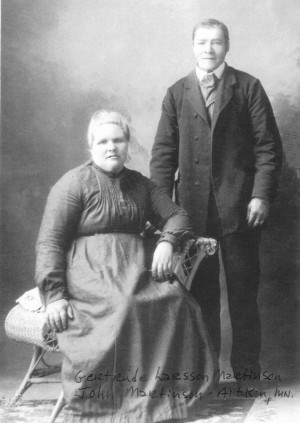
John and Gertrude Martinson in Aitkin, MN
Photo from an distant cousin in USA.
Ingrid writes: "It is the first time we have seen our grandfather's father ~ amazing! I didn't believe that we wpi;d ever have a photo of the 'unknown' and now we have. I have made copies for all 'Martinsons' in my family.
"Since I first wrote to you, I have also gotten in contact with more of the Martinson-relatives in Minnesota, California, Wisconsin. It is just great!
Today I have gotten photo of the farm from a neighbor of the Martinson farm in Spirit Lake, Aitkin.
A Martinson relative is coming to Stockholm in June so we will meet. Isn't it fantastic! I hardly believe it"

JOHN MARTINSON'S AMERICAN FAMILY IN AITKIN, MN
The John Martinson family settled down in Farm Island Township, Aitkin Co in 1890
They had a son born in Sweden: Johannes b.16 March 1886 and d. 15 May 1886 ~ only two month old.
In America, they had five more children: Martha b.10 July 1889, John Olof (Ole) b. 2 Apr 1890, Lars Martin b.18 Oct 1893, Robert b. 8 Jan 1896, Jennie (Jenny) b. 17 March 1900.
The first son, Martin, died on the voyage of dysentary. That's why they named the son b.1893 for Martin ~ this was common in Sweden as the names they used were old "family-names" and Gertrude's paternal grandfather was named Martin (or Mårten = Morten in Swedish).
All these where half siblings to my grandfather J.A., but he didn't know anything about them and the family in USA.
Elin (Ellen) b. 1879 ~ d. 1928 married John Woodrow; Aitkin, MN
Brita (Bertha) b. 1881 ~ d. 1965 married Eric Engquist; Gemmel, MN
Martin b. 1883
Martha b. 1889 ~ d. 1949 married Carl E Skog; Crosby, MN
Ole b. 1890 ~ d. 1970 unmarried, home farm, Aitkin, MN
Martin b. 1893 ~ d. 1973 Wife: Marie ? Minneapolis, MN
Robert b. 1896 ~ d. 1975 married ?? Salem, Oregon
Jenny b. 1900 ~ d. 1988 unmarried, Bloomington; MN
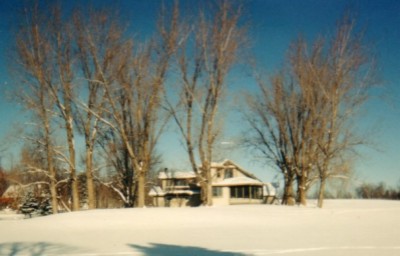
This photograph of the Martinson farm were taken by Roger & Kathy Pearson, neighbors The Pearsons once bought a plot from Ole Martinson, the son of John M. Ole's sister Jenny inherited the farm after Ole's death and sold it at once.
Kathy writes: "The view is from the shores of Spirit lake. The original house did not include the addition on the left side. The new owner built an attached garage with a room above it when he bought the home from Jenny Martinson."
In the trees to the left you can see the original barn.

Of course are a lot of children, grandchildren and great-grandchildren and I'm hoping to make some contact just to learn a little about the Martinson family's life in Minnesota. It is so great to have found my grandfather's father and to learn a little about his family ~ they are all a part of my family story.
I have read in some death Obits that Gertrude got the surname of Hanson, but that must be a mistake as she is written with the surname ' Jonsdotter' or 'Jonsson ' in the church records here. Gertrude' s parents were Jon Larsson and Brita Olofsdotter.
I have gotten fantastic help from some researchers in Minnesota and I thank them all so much! Most of all Shirley Davies of Aitkin who gave me the start and led me to the right sources. And then Anna Claxton of Northfield, Eva Olsen of Clear Lake, Sheila Trosak, Randy Wall and Barbara Timm: All of you have responded so positively to my asking for help and guided me in my search for the unknown side of my family.

Well the son of John Martinson in Sweden, Jöns August (J. A.) also started a family and we have grown and become a clan of J.A.-descendants today:
Jöns August Ekberg b. 29 Sept. 1872 ~ d. 3 June, 1936 Berg parish
Marriage 12 June, 1898 to:
Ingrid Martha Andersdotter b. 28 Sept. 1870 ~ d. 31 May, 1954 Berg parish
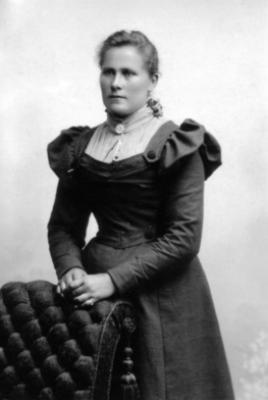
Ingrid Martha Andersdotter Ekberg
Their children are:
Anders Gustav b. 25 Feb. 1899 ~ d. 1 May 1900
Anders Natanael b. 22 Dec.1902 ~ d. 12 Jan. 1903
Anna Margaretha b. 27 Dec. 1900 ~ d. 26 June 1953
Erik Ingemar b. 3 Nov 1904 ~ d. 8 Feb. 1976
Ingeborg Elise b. 5 Feb 1913 ~ d. 27 Jan 1988

There are 7 grandchildren of J. A, 14 great-grandchildren and 19 great-great-grandchildren. Today we all are a small part of the new Martinson-file of the Aitkin Museum, thanks to Shirley Davies!
Greetings from one of the great-grandchildren of John Martinson of Aitkin Co and grandchild of Jöns August Ekberg, Berg, Jämtland and daughter of Ingeborg ~ Ingrid Wikberg of Stockholm Sweden, with roots in the province of Jämtland, Sweden.

COMING TO AMERICA ~ THE LONG WAY!
This letter was written by Jon Molinder and Axel Persson to their friends in the local " IOGT Gibraltar" Club in Vigge, Berg parish, Jämtland, Sweden.
They and a group of friends left for North America in May 1888. They left their village May 10, and left the port of Trondheim on May, 16, 1888.
Among the friends in the group are Jon Mårtensson and his wife and three small children. They came by mistake first to Canada, but then arrived in Seattle, WA for some years of hard work. Jon and his family settled down for good in 1890 as farmers in Aitkin Co, MN.
Jon Mårtensson, b 3 Nov 1850, became John Martinson in USA and he was the father of my grandfather JA Ekberg.
I have translated the letter into English and tried to be as correct in my translation as possible.
Ingrid Wikberg, Hägersten, Stockholm, Sweden -February 2004.
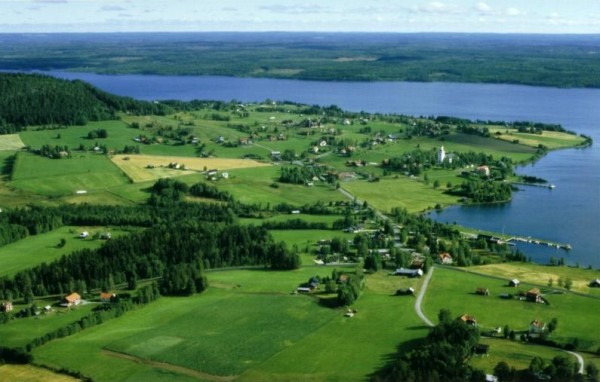
Ingrid writes: "This is a view over the village Hoverberg in Jämtland, where I was born and grew up. This was the church village for the Martinson family of Vigge. The mountain 'Hoverberget' starts at the left top. You can see a small road to bottom left; through the small 'forest' and with some houses close to it. The road takes you to Vigge where Martinsons lived. The water is a bay of lake Storsjön. You can see the steamer bridge at the shore, right from the church. And to the left from the steamer bridge, close to the water, lies the old cemetery surrounded of a hedge of trimmed spruces. The photo is from 1996. This is a very beautiful place!"
I Walk in my Thoughts the Roads of my Childhood ~ Ingrid

Washington state on the Evening of July 1888
To IOGT Gibraltar:
To keep the programme we will as best as we can try to entertain you in your meetings. But we will ask you to prepare yourself that our letter will not be so much entertaining – you can't just expect that. But we will tell you the story about how it is to go to America.
As you maybe have heard about, we got stormy weather on our first boat-trip over lake Storsjön. The storm didn't harm us the way it used to harm on the sea, it was only for the best of us, after saying goodbye to friends and our relatives we were in a little bad shape. But when we arrived at Sunne community hall, we felt as in normal standard again. We stayed there on our first night of our America journey.
How much we slept and how we felt ~ about that we will not talk. We survived our second day and arrived at our "big" city of Östersund. There we met a group of friends from Klövsjö and Skålan, among them a guy well known as "Back-Jo."
Next morning, Sunday, we went to the railway station and bought tickets for Trondheim. We said our last farewells to friends coming to the station and we left our home district. We felt that it was just like we heard about: the journey was a journey of joy and all was new for us on the train. We saw the beautiful village of Krokom, the skyhigh Åreskutan, the bold gloomy mountains, the wilderness on the border of Norway, and the price of a cup of coffee on the station a s o.
In Storlien we stayed for some hours to change trains. Now we were leaving Sweden, our native country, that we just started to learn and love.
The first Norwegian houses, close to the border, were not so nice to see. They looked to be old and big as hay barns and roofs covered of "field grass."
At the station close to Trondheim there came two agents from different ship lines to meet us and they came into our coupe. You have heard ordinary people quarrel…but you have never heard Norwegian agents quarrel when they argued and told each other what kind of persons they were …oh…! But we learned a lot about them, and before they had stopped their arguing we had made up our minds about which one to choose.
But it became worse as we arrived at Trondheim railway station. There came more agents from different ship lines and they seemed to want to carry us all in their arms. We didn't know what to think: if we really were popular personalities or if we only were good hunting for them. Among all of them crowded around us, taking our arms, all warning us against other agents for different reasons and to avoid being fooled, we saw one from Bogrens time ~ it was "Drink Elias." He was agent for National-line and he was also going to USA and he told us about a lot of advantages we may get from him if we made company with him as official and ~ as he said ~ "his" line was the absolute best one of them all.
Well, we survived even this and "Drink Elias" and his colleagues and on Tuesday evening we met with Jöns Jonsson at the station. We then visited the Nidaros Dome, the castle and other places, bought our tickets, bought some thin metal vessels, changed our Swedish money into dollars, visited the police station to show our papers confirming that we could read and write and that we two were single, and more Christians matters.
We went Thursday to board a steamer that was going to bring us from our country and from the North. The name of the steamer was "Hero." It was an ugly ship with no comforts, so we nearly got seasick before leaving port and we thought the dog-name Hero was a perfect name. But thanks to lovely weather it all went perfectly and we even felt that we never wanted to leave our life as sailors. Well, well, we were not going to have it so wonderful for a long time. When we met the North Sea and it started to blow quite hard, it wasn't so nice to play sailors. From start we had dance, music and games on deck, but now there was no playing. Instead, there were passengers staying or laying and throwing the ship's food away faster that it was imbibed. We stayed in our bunks and tried very hard to not do the same as others did, but we couldn't avoid it.

Hero II, Wilson Line. Built in Kingston-upon-Hull 1865. Broke up 1896
At last, on Whit-Sunday, the weather became nice again. We got new bunks and Hero brought almost only fresh and healthy passenger into the harbour of Hull. In Hull we had time to look around a little. We saw a seven store house made of stone and some houses not as big as the seven store house but they were quite big. A lot of salesmen and women tried to sell things to us and they sang in chorus the price of their items.
From Hull to Liverpool it went faster than our "nole-ole-man" run from Moo to Dalåsen, and in five hours we went across England. But oh how much nice nature we saw during these hours, wonderful and great things. We really enjoyed ourselves. We travelled through cities, through big mountains and the most wonderful landscapes. Of strange thing we saw, were a couple of very big and high chimneys, so high ~ so for sure an ordinary chimney-sweeper must take food for a day with him to climb up and down in chimneys like these.
And Liverpool! It was something to see. Something nice maybe… Yes even so! And we saw a Baccus-temple or Magazine for Liquor with ornaments and gold both inside and outside, with a huge golden barrel as a sign. Outside this elegant palace and all over the streets there were an awful lot of half naked, dirty and miserable groups of children and drunken men and drunken women staggering the streets. Even if we saw such bad things before, we had never seen so much, so many. A drunken mother with a baby in her arms and a raggedly girl hanging on her skirt came staggering down the pavement ~ both children crying. You don't have to be weak, you don't have to be a member of the Godtemplars, to feel a painful reaction over this.
We have heard men of sober habits describe all misery created by drunkenness, but you can't, if you not have seen it, realize all the misery there is all over Liverpool. And we only saw things outside. How does it look like in these families, these women's homes ~ if they have a home? Maybe most of them doesn't know the meaning of a home.
A great part of the older "street boys" were shoe-cleaners and walked around with shoe-black, a brush and a wooden block to put your feet on. If you preferred to walk with unblacked shoes, you had to run fast if you saw them or they took a hold on you, both legs and tried to start their work. Olof Larsson handled it well, as he wore boots with hairy handles. Such boots were unknown here and people stared at him and the shoe-boys didn't want to work with his boots when he put his feet on the block.
The street boys of Liverpool proved not cowards, we understood the first evening in town. Some immigrants were of some reason involved in trouble with them and a huge army of boys came to the immigrant house and started a war throwing stones against them. Thanks to the police, the immigrants could retire and get out of trouble.
On the quay, where we should embark on the ship, the crowd was enormous, so we had a hard work to reach the boat that took us out to the big steamer "Britanic," on anchorage in the sound. Now the great ocean-journey started with beautiful weather and happy moods and we thought that now it was just impossible to became seasick in such a comfortable vessel and with a nice journey ahead. But how did it go? Already the second day it started to smell on board. Even we two felt we were no sailors, but we didn't became that bad, although we were economic with the ship's food. We didn't taste tea or coffee during the whole journey, as that reminded us too much of "Hero" and it didn't taste so good. Life on board seemed more unpleasant than pleasant.
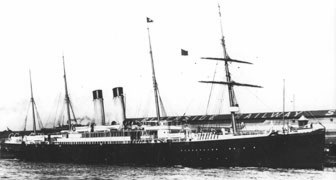
Britannic 1874 – 1903 White Star Line
About 300 Irish, men and women, came on board in Ireland. They practised all the time their "English Trip" and were carrying on flirtation in a shameful way and they didn't act so proper and nice. We didn't like the Irish girls and they seemed to feel the same about us.
On Sunday the Irish celebrated Catholic service and it looked funny. The girls that had danced most of all read from a book in a way just like schoolchildren rabbles their home work and now and then the whole crowd rabbled together in the same way, made cross-signs in a fast tempo and all of them kneeled with uncovered heads on the deck-floor. This was in the morning; In the evening the dance and flirtation started all over again. But nine o'clock they had to stop and all the women were ordered to their cabins. Some of our male friends were also separated from their women ~ among them Jon Mårtensson and A. Karlström and three more from Jämtland. We had to laugh at it, even if it wasn't much to laugh about. So we had a little fun sometimes at sea, but it was also often boring and to us it felt that the journey over sea wasn't a journey of joy.
But at last, after we first had seen land and lost it, we reached New York in the morning of June 1. We were all a little lazy after the long journey and we saw that we were nine days older since we left Liverpool. In New York we didn't have so much time. Most of our time we had to look after our selves and our luggage. The most remarkable was the brutality with which the officials of Castlegarden treated immigrants. We met, inside Castlegarden (a huge building) a person well known by us and of you: the Godtemplar P, Bergström from Östersund, and we talked a lot and he told us about a meeting in New York.
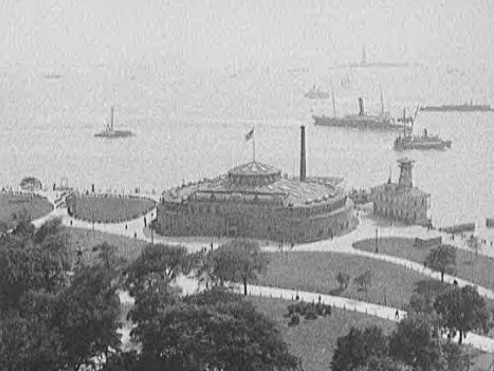
Castle Garden Immigrant Processing Center, New York, NY, ca 1906
In New York we were separated from Jöns Jonsson and some more in our company and it all happened so fast that we even didn't have time to say goodbye. It was already dark when we left New York, so we could almost say we never saw the city. We tried to feel happy over being on ground, but it was hard as we all were tired and we had nowhere to go to sleep. We had to sit and try to sleep in a wagon shaking like a gig.
The second day we started to see America. One picture after the other was out there to be watched by us. One English-speaking Swede in our company asked at a station what the name was. He got the answer that this was the Land of God!
On Sunday morning the 3rd, we arrived to Chicago. There we said goodbye to Ol. Larsson. From the station we stopped at and to the other station quite far away, we rode a tramcar driven by two skinny horses which had to work hard to take us 20 persons and all our luggage up and down the streets. In Chicago we all get a nice needed rest from seven in the morning until five in the evening, when our journey started again with a faster tempo than the journey from England. At 8 o'clock in the morning we arrived in St Paul where we stayed for twelve hours. We sent a telegram to H. Berglin in Minneapolis and it didn't take long before we met face to face with the boss of North Western Metal Foundry, the inventor, etc. H. Berglin. We all recognised him at once, but he only recognised Jon Ersson. He wasn't so respectful that we thought an inventor had the right to be. He was very kind and polite, guided us in the city and showed us all the great things worth seeing. Olaus (a friend from Vigge) worked as a bricklayer outside town and we planned to get there and see him, but after our sightseeing there were no time over for that. Of Minneapolis, not so far from St Paul, we only saw some lit-up buildings, as it was dark when we went through the city.
The second day we came out on the prairie, which we all have longed to see, but not see more of than we had interests in. As far as we saw ~ no trees, not even a small bush. Here and there we saw a shelter or a mud-hut that didn't look so inviting and we thought it must be better to have just a small piece of nordic soil, than all these empty, deserted fields.
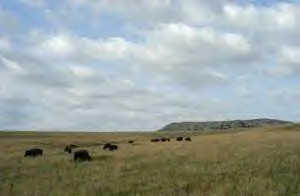
On the prairie there also were Indians living in tents made of clothes. At some stations were crowds of Indians and they even get on board the train trying to sell animals' horns. At first we all were curious, but not as curious as they were, but after a while we didn't care so much.
We thought the Indians didn't look so nice. They had too long noses, wide mouths and long straggling hair, horrible long nails, very protuberant cheeks, brown skin, sometimes even red-coloured foreheads and wrapped in variegated blankets.
As we had a map with all the stations marked we suddenly realised we were on the wrong track! (We couldn't understand how they could go the wrong direction out in the desert) and we understood we were on the Canada railroad instead of North Western Pacific.
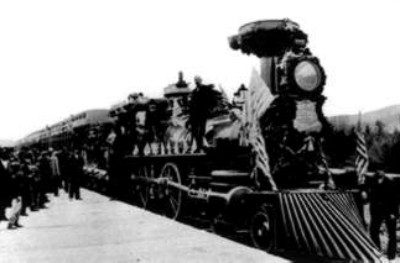
Well, it didn't help to argue about this, we just had to travel along. The train went quite slow through the prairie, so we wanted to force "Back Jo" to run to the next station and order coffee for us as we arrived. After what felt like a long "desert-walk," we arrived in Winnipeg, where we stayed until Thursday and we had free lodging in our rail-wagon. But it seemed that many local hotel employees were very interested in our welfare and they tried in different ways to move us into local hotels.
The city of Winnipeg was founded about seven years ago and there nearly was only one real street. Almost every house in the city had a flat roof. In this corner of the world you don't expect to meet someone you know, but alas, while we were there we met a girl we knew, Matilda Öberg from Oviken. She had been there for eight weeks and already so comfortable in the language that she used English words when we talked. She stayed with another girl from Sunne, Jämtland and they stayed with a guy from Jämtland too, from Offerdal, and he had a boardinghouse.
Well, there is a lot to say about Winnipeg, but instead of tiring talk we will just jump over the boardinghouse, all landlords, agents selling Manitoba, over the prairie ~ so wide and empty, more awful than the prairie we just crossed, and stay among the mountains of British Columbia where the railroad moved on. We were tired of the great prairie and longed for a new landscape where our eyes would meet something more than just naked fields and Indians, and now our wish came true as we didn't have to get tired of new flat land.
The railroad, not so well built, went first many hundred feet up in the mountains as we stared down on terrifying depths and down into a river. We knew that it was something special to travel among Norwegian's mounts, but they are nothing compared to these Columbian mountains. We were both surprised and got white and sweaty as stones and pebbles fell because of the heavy train. The railroad is very badly built: not one bridge of steel, only wooden bridges that swayed hard as we went over them. So we felt released after a whole day in the wilderness, now suddenly going into green grass and we saw a nice hut among the trees.
On the Sunday morning we arrived in Vancouver and there, as in Winnipeg, we were advised to stay over in our wagons. Here we learned to meet a Swede, living in the town, that we first felt a little negativity against, but we soon realised he was a very nice person. He guided us everywhere in this small town which was only two years of age. He showed us a Swedish example of a well known personality all over America, called Vagrants. It was just a young man, with a nice but sad face, that, our guide told us, was in a drunken state for over three weeks. He was not the only one. It was very common anywhere you could buy liquor. It is very sad how they spend all the money they have earned doing hard and tough jobs.
In Vancouver we also met for the first time the "Salvation Army" and we also visited a Methodist church, where we heard the best songs since we were back home in Sweden.
But the most strange thing we saw, were the hard and brutal control the Chinese immigrants had to go through before they were allowed to embark on the ships that will bring them to their destinations. The Chinese must be the poorest and most badly treated people wherever they were going. We felt then, and even more so later, great compassion for these poor people.
A very nice steamer took us from Vancouver to Seattle where we arrived at 5 o'clock Tuesday morning. Until then we have had help from our agents, but now, after we had used our last ticket, we had to help ourselves as best as we could. And what a help….
We stood at the quay and asked ourselves where to seek for help. Near us stood a driver who said he came for a Scandinavian hotel and offered us a drive. We thought that he belonged to the staff of the hotel, there to guide us, and all seven of us get into the wagon. When he stopped outside the hotel we all get off and started to go inside, but he stopped us. "One dollar," he said. We gave him one dollar under protest. "I want one dollar from each of you." We thought we had payed enough and tried to speak common sense to him and told him that he was a cheater. You can sell milk for 10 cents, and coffee with bread for 20 cents, that we knew for sure, but not even in America can you earn seven dollars for a 10-15 minute's drive ~ that we couldn't accept. But a Swede that came walking by told us that this kind of gentlemen had the right to take what price they preferred and that we couldn't protest against it. We had to pay one dollar each and we swore that we never ever should go by wagon. The drivers can starve ~ we didn't care.
After some trouble we at last found an ugly steamer to reach Poulsbo. We got all our luggage transported over and at last we could leave for our final destination. After a three hour trip we landed at a kind of free bridge or raft out in the water and there we had to step off with our luggage. We rubbed our eyes and we stared at all sides just to see if there were a place worth the name of Poulsbo, but we couldn't see anything more than some huts in the woods and there we were, left totally alone in the middle of the lake.
After a while, two boats arrived and saved us from our dilemma and suddenly we were in Poulsbo. Yes at last, our long, sometimes troubling, sometime wonderful journey had come to its end.
Mrs Wistrand came and met us and took us to a nice Danish settler, where we all could rest for our first night in the well known and famous state of Washington. We could describe how Poulsbo looks like and the surroundings, but we prefer to not do, so if you plan to leave, decide to not leave and go to Poulsbo.
Well, now we were at our destination and we started to search for happiness….and on our way we came to a saw mill where we met Olof Wistrand who was our interpreter. He informed the boss that we were ready to work with whatever we were told to. If we had spoken the language called English, we maybe could have gotten a job at once, but as new as we were, they didn't have job for us at once, so we only had to return the nine miles (English miles) on the long, long pat to Poulsbo.
Now we visited all logging camps there were in the area, but all over it was ‘no' to our question for a job. It started to feel a little troublesome, but we decided to follow the advice a Swedish worker had given us: be cool, as long as we don't have to sell our Swedish purses, and keep our heads high. And at last we got lucky. After many sad days of walks all over, we got jobs as saw mill workers in Port Gamble.
Well, we might talk about our jobs, the working life and all about Port Gamble…but we have already tired you and ourselves with a long letter and we will stop here ~ but first we will tell about the "creole girls," the small cabins, that we heard about at home. The groves are more romantic than idyllic. There are no fruit trees or flowers, but enormous pines, firs and cedar trees and creepers with thorns that go through gloves and boots. The cabins are simple but nicely made of tents, not eastern style, but as the houses of Vancouver ~ not in renaissance or villa style ~ more like sugar cones style. The sweeties living there are called squaws by Americans and Indian girls by the Swedes. They who know them better call them…well it doesn't matter, but we call them "creoles." They are not so pride ‘von oben' as American women are who go dressed with a hat. Oh, no, they don't use hats or shoes and if you didn't know that they work extra with laundry; you maybe thought that they also saw soap and water as something not necessary.
When you are in America and will be polite to ladies you just don't lift your hat a little. You have to take your hat off as you walk by and you don't look intensively into their eyes.
This about us and America.
But how are you all doing, your club meetings, your picnics and so on? We do think very often about our last meeting, particularly the last farewell-party. Thank you all for your love and care. We hope to meet again at many nice meetings.
Brothers and Sisters! We think of you in all that way; don't let misfortune and bad things make you sad ~ just keep on!
Brotherly,
Jon and Axel
PS
We ask you to not count all wrongly written words in our letter. Most of it is written in evenings and even in darkness. We have been a little stiff in our fingers and our thoughts have often been far away from the subject, America. And about spelling and punctuation ~ you can't expect more from us, as you know our time in school in Moo was too short.
 HOME
HOME
|

